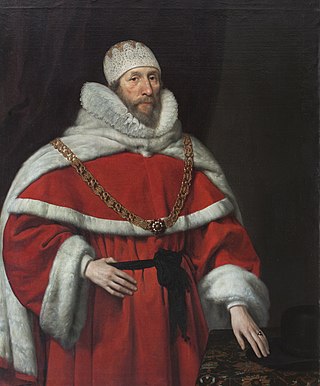Related Research Articles
Anthony Munday was an English playwright and miscellaneous writer. He was baptized on 13 October 1560 in St Gregory by St Paul's, London, and was the son of Christopher Munday, a stationer, and Jane Munday. He was one of the chief predecessors of Shakespeare in English dramatic composition, and wrote plays about Robin Hood. He is believed to be the primary author of Sir Thomas More, on which he is believed to have collaborated with Henry Chettle, Thomas Heywood, William Shakespeare, and Thomas Dekker.

George Chapman was an English dramatist, translator and poet. He was a classical scholar whose work shows the influence of Stoicism. Chapman has been speculated to be the Rival Poet of Shakespeare's sonnets by William Minto, and as an anticipator of the metaphysical poets of the 17th century. Chapman is best remembered for his translations of Homer's Iliad and Odyssey, and the Homeric Batrachomyomachia.

Philemon Holland was an English schoolmaster, physician and translator. He is known for the first English translations of several works by Livy, Pliny the Elder, and Plutarch, and also for translating William Camden's Britannia into English.
John Owen was a Welsh epigrammatist, most known for his Latin epigrams, collected in his Epigrammata.

Sir Henry Bedingfeld (1505–1583), also spelled Bedingfield, of Oxburgh Hall, King's Lynn, Norfolk, was a Privy Councillor to King Edward VI and Queen Mary I, Lieutenant of the Tower of London, and Vice-Chamberlain of the Household and Captain of the guards. With Sir Henry Jerningham he was among the principals who rallied to Mary's cause following the death of Edward VI in 1553 and helped to set her upon the throne. He was a senior figure in the kinship group of Catholic recusant landowning knights of Suffolk. Given responsibility for the custody of Mary I's half-sister Elizabeth when in the Tower of London and at Woodstock, his reputation has suffered from the repetition of claims of his severity towards her: however Queen Elizabeth was respectful towards him and continued to find service for him. Among the foremost Englishmen of his time, he occupied prominent and honourable positions and was of unquestioned loyalty.

Sir Henry Hobart, 1st Baronet, of Blickling Hall, was an English politician who succeeded Sir Edward Coke to become Chief Justice of the Court of Common Pleas.
Thomas Twyne was an Elizabethan translator and a physician of Lewes in Sussex, best known for completing Thomas Phaer's translation of Virgil's Aeneid into English verse after Phaer's death in 1560, and for his 1579 English translation of De remediis utriusque fortunae, a collection of 253 Latin dialogues written by the humanist Francesco Petrarca (1304–1374), commonly known as Petrarch.
Sir Henry Jerningham KB was an English courtier during the Tudor period. He was a Gentleman Pensioner during the reign of Henry VIII. In the succession crisis of 1553 he was one of the foremost supporters of Mary Tudor, and after her accession was one of her most trusted servants, being appointed Vice-Chamberlain of the Household, Captain of the Yeomen of the Guard, and a member of the Privy Council.

Alexander Neville (1544–1614) was an English scholar, known as a historian and translator and a Member of the House of Commons.

John Astley, also seen as Ashley, was an English courtier, Marian exile, and Master of the Jewel Office. He was a Member of Parliament on many occasions.

Henry Ussher was an Irish Protestant churchman, a founder of Trinity College, Dublin, and Church of Ireland Archbishop of Armagh.
James Sandford or Sanford was an English author, known as a translator of Epictetus and Cornelius Agrippa. According to Sidney Lee in the Dictionary of National Biography, he may have been a native of Somerset, and uncle or cousin to John Sandford.

Robert Cooke was an English Officer of Arms during the reign of Elizabeth I, who rose swiftly through the ranks of the College of Arms to Clarenceux King of Arms, serving in that office from 1567 until his death in 1592–3.
John Stockwood was an English clergyman, preacher, translator of Protestant texts and school-master.
Sir Robert Dallington (1561–1637) was an English courtier, travel writer and translator, and master of the London Charterhouse.
William Bavand was an English lawyer and translator. He is chiefly remembered as the translator of Johannes Ferrarius’s The Good Ordering of a Commonweal (1559).
Sir Drue Drury was the son of Sir Robert Drury, the grandson of Sir Robert Drury, Speaker of the House of Commons, and the nephew of Sir William Drury. He was an English courtier and politician who sat in the House of Commons at various times between 1562 and 1584.
Simon Patrick was an English gentleman of Lincolnshire, known as a translator.
Edward Lapworth (1574–1636) was an English physician and Latin poet, and the first Sedleian reader at the University of Oxford.
Thomas Peend or Delapeend was a Tudor poet and lawyer. He is chiefly remembered as the author-translator of A Pleasant Fable of Hermaphroditus and Salmacis (1565).
References
- ↑ Franz, Patricia M. (2006) The Horseman as a Work of Art: The Construction of Elite Identities in Early Modern Europe, 1550—1700 Ann Arbor: ProQuest. p. 326.
- ↑ T. Bedingfield, Cardanus Comforte, T. Marshe, London 1573. Full text (page views) at Hathi Trust. Text-only version at Umich/eebo.
- ↑ Franz 2006 p. 326.
- ↑ Franz 2006 pp. 327–8.
- ↑ Einstein, Lewis. (1903) The Italian Renaissance in England: Studies. New York: Columbia University Press, pp. 301, 308, 315.
- ↑ Stow, John. Survey of London, ed. 1720, IV:iii, 65.
- ↑ This article incorporates text from a publication now in the public domain : Stephen, Leslie, ed. (1885). . Dictionary of National Biography . Vol. 4. London: Smith, Elder & Co. p. 115.
DNB references
These references are found in the DNB article referred to above.